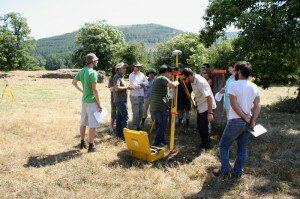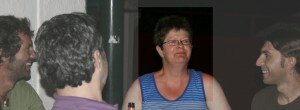Interview with a participant of the formation week
Interview with Pernille Foss from Denmark, one of the participants in the 1st Specialization Forum in Ammaia (Portugal), July 4 to 11, 2010.
Q – The 1st Specialization Forum in Ammaia is coming to an end. What is your impression on lessons and teachers?
A – What most impressed me was the dedication of the teachers, their enthusiasm and the effort they made in bringing in the equipments and materials for practical presentation purposes. Most lectures were well structured and rather revealing, although there was a slight overlapping of lectures on one of the subject matters. I was of course most interested in the matters I’m currently working on, but was very pleased to have been introduced to a wide array of different themes and approaches that were new to me. Geophysics was not in focus this year, but I already know that “Geophysics and Geomorphology” is the theme of the 2nd Specialization Forum, so there is always a chance to get into it next Summer.
Q – And what do you think of the course composition and your fellow participants?
A – I think that the international provenance of both teachers and students is a good asset of the course. The exchange of experience is important to our work and I might stay in contact with other colleagues – at least the ones closer to my age and interests – or get back on the offer teachers have made to provide us with further information or practical advice. It’s hard to get inside of projects, sometimes even in your own country. In this sense the course provides an important opportunity to network. The more interaction there is the better.
Q – Would you say that the course corresponded to your expectations? Do you have any suggestions to make?
A – Well, I had hoped to receive an introduction to several different survey techniques and to engage in the use of the different equipments that are currently in use. What is LiDAR? How does low platform photogrammetry work? What is the use of laser scanning in archaeology? I received a good overview on these subjects, but was a little disappointed that there were rather limited opportunities for practice. I know that this is difficult to organize. You just can´t have 10 or 20 total stations for everybody to have a go. In my country, it is sometimes difficult to find someone who actually works with these equipments, since they are very expensive. But I think that improvements can be made by dividing the participants according to their knowledge and interest, and to interpolate the theory on survey techniques and data processing with practical exercises. Learning by doing, that is important, because doubt rises when you actually have to apply things that theory conveyed. These are, I think, things that should be improved, but on the whole I’m very satisfied with the course and my stay here in Ammaia.
Q – So you would recommend it to others?
A – Surely I would. With a greater amount of practice, the course has all possibilities to be really good.
Photographs

Impression from the classroom with Prof. Corsi teaching

Demonstration of Terrestrial Laser Scanning by Gary Devlin from The Discovery Programme (Dublin)

Field demonstration of Differential GPS by a team from the Institute of Archaeology in Merida

Setting up of the Blimp for Low Altitude Aerial Photography



